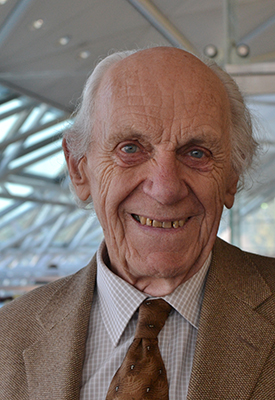 The Faculty is saddened to report the death of Len Sealy.
The Faculty is saddened to report the death of Len Sealy.
Len’s association with the Faculty spanned well over half a century, beginning with his time as a PhD student at Gonville & Caius College in the late 1950s. After returning to New Zealand for a while, Len was elected a Fellow of Caius in 1959 and joined the Law Faculty, serving initially as a University Lecturer and latterly as SJ Berwin Professor of Corporate Law. Len contributed enormously both to the Faculty and to Caius. In College he served variously as Tutor, Senior Tutor, and Admissions Tutor. He was Faculty Chair from 1988 to 1990, when he piloted the selection of Sir Norman Foster as the architect of the David Williams Building, and served as editor of the Cambridge Law Journal from 1982 to 1988.
Generations of law students benefitted from Len's teaching, which combined informality and rigour, and from his extensive scholarly output. Countless students learned about company law through the prism of his Cases and Materials on Company Law (currently in its 11th edition, which Len co-authored with Sarah Worthington). The same can be said for commercial law with Cases and Materials on Commercial Law, which just moved into its sixth edition with five renowned experts continuing the legacy of Len and his co-author Richard Hooley.
Practitioners also were the beneficiaries of Len’s scholarship, primarily in the area of insolvency law. Twenty-three editions of Annotated Guide to the Insolvency Legislation (co-authored with David Milman) have been published since 1987. There also were five editions of Disqualification and Personal Liability of Directors, first published in 1986. As for academics, Len’s work on fiduciary duties was highly influential and drew heavily on numerous incisive pieces Len authored for the Company Lawyer and the Company Law Newsletter. Of particular note was Len’s Company Law and Commercial Reality, published in 1984, where his argument that UK company law was counter-productively complex and cumbersome influenced company law reformers at least through to the enactment of the Companies Act 2006.
Reflecting on Len, Pippa Rogerson, one of his closest and longest standing colleagues, remarked, "Personally, I only returned to Cambridge (and Caius) to take a PhD with Len's encouragement and support. It was typical of him to want the best for any of his students. That did not have to be high academic achievement or legal success. He was just as pleased when a student made the Blue Boat, or starred in a play, or became President of the CU Conservative Association or the CU Labour Club."
Len can be heard reflecting on his career in his extensive Eminent Scholars Archive entry.
The Faculty’s thoughts are with Len’s wife, Beryl, and his family.

 Facebook
Facebook  X/Twitter
X/Twitter  Instagram
Instagram  YouTube
YouTube  Flickr
Flickr  LinkedIn
LinkedIn